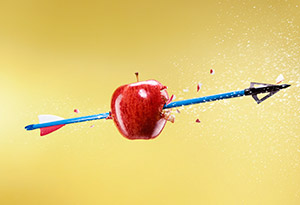How to Trust People—Even When You Expect the Worst

Photo: Mauricio Alejo
PAGE 2
The next day, when a woman I volunteer with complimented me on a newspaper article I'd written, my gut reaction was to deflect the praise. I assumed she was buttering me up to ask for help with some writing task, as she had done in the past. But then I recalled something David Dunning, PhD, professor of psychology at Cornell University, told me before I embarked on this mission: Since we're more likely to remember betrayals than positive interactions, we underestimate people's sincerity and generosity and overestimate their selfishness.
In one study Dunning led, he asked participants what they thought would happen if they gave money to strangers who had the option to split the cash with them or keep it all. The givers guessed the receivers would share the money about 45 percent of the time. In fact, the receivers said they would hand back half the cash in nearly 80 percent of the transactions, proving Dunning's point that we're often unfairly cynical about others.
Now, in the face of the woman's kind words, I could see that our past interaction had triggered my negative response. It was up to me to reset my perspective, so I forced myself to trust that she was being sincere and thanked her. When she didn't follow up with a request for help, I moved on, proud that I had done the right thing. I hadn't predicted that by trying to see the good in others, I'd wind up feeling better about myself.
I realized then that this experiment was about more than just learning to trust people—I was letting go of some of the pessimism I'd allowed to build up in my life. Freeing myself of my "everyone's a jerk" mentality was indeed feeling like a far less taxing way to live, and as the day went on, I noticed that I wasn't getting as heated over little perceived injustices. In fact, later that afternoon, when another driver pulled into a parking space I was about to take, I didn't immediately assume he intentionally stole it from me. Instead, I took a moment to see it from his view—maybe he thought I was just idling on the street or that I'd stopped to make a phone call—and it actually seemed like an honest mistake. By the time I found a new parking spot, I was over it. The draining, time-consuming anger I would normally have felt in this situation had vanished.
It's inevitable that I'll get duped again, but that's the price of trust. "One person's bad behavior isn't a reflection of humankind," Dunning says. "Rather than living your life on high alert, you have to be willing to be vulnerable." And as I have learned, the payoff of having a little faith—that someone in need could truly use your help; that a person you used to keep at arm's length could become a friend—far outweighs the fear of feeling like a fool.
Alina Tugend is a New York Times columnist and the author of Better by Mistake (Riverhead).
More on Trusting Yourself
In one study Dunning led, he asked participants what they thought would happen if they gave money to strangers who had the option to split the cash with them or keep it all. The givers guessed the receivers would share the money about 45 percent of the time. In fact, the receivers said they would hand back half the cash in nearly 80 percent of the transactions, proving Dunning's point that we're often unfairly cynical about others.
Now, in the face of the woman's kind words, I could see that our past interaction had triggered my negative response. It was up to me to reset my perspective, so I forced myself to trust that she was being sincere and thanked her. When she didn't follow up with a request for help, I moved on, proud that I had done the right thing. I hadn't predicted that by trying to see the good in others, I'd wind up feeling better about myself.
I realized then that this experiment was about more than just learning to trust people—I was letting go of some of the pessimism I'd allowed to build up in my life. Freeing myself of my "everyone's a jerk" mentality was indeed feeling like a far less taxing way to live, and as the day went on, I noticed that I wasn't getting as heated over little perceived injustices. In fact, later that afternoon, when another driver pulled into a parking space I was about to take, I didn't immediately assume he intentionally stole it from me. Instead, I took a moment to see it from his view—maybe he thought I was just idling on the street or that I'd stopped to make a phone call—and it actually seemed like an honest mistake. By the time I found a new parking spot, I was over it. The draining, time-consuming anger I would normally have felt in this situation had vanished.
It's inevitable that I'll get duped again, but that's the price of trust. "One person's bad behavior isn't a reflection of humankind," Dunning says. "Rather than living your life on high alert, you have to be willing to be vulnerable." And as I have learned, the payoff of having a little faith—that someone in need could truly use your help; that a person you used to keep at arm's length could become a friend—far outweighs the fear of feeling like a fool.
Alina Tugend is a New York Times columnist and the author of Better by Mistake (Riverhead).
More on Trusting Yourself



